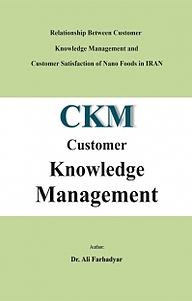امکان مطالعه در اپلیکیشن فیدیبو
دانلود
کتاب Relationship between customer اثر Ali Farhadyar نشر کلید پژوه
knowledge management and customer satisfaction of nano foods in IRAN
کتاب متنی
درباره Relationship between customer
In the present post- industrial society, knowledge has become a key resource of the economy. Increasing demands of customers concerning quality and innovativeness of products and services put companies under pressure. At the same time, threats from worldwide competitors force them to reduce the price of products and services. In these circumstances companies should be redesign their business process. In that economy where the only certainty is uncertainty, the one sure source of lasting competitive advantage is knowledge. Indeed, knowledge is the most important strategic resource and the ability to acquire and develop it, share it and apply it can lead to sustainable competitive advantages.
In recent years, organizational effort has been put into knowledge management (KM) Initiatives that became one of the management buzzwords. Knowledge management is the systematic management of an organization's knowledge assets for creating value and meeting tactical & strategic requirements; it consists of the initiatives, processes, strategies, and systems that sustain and enhance the storage, assessment, sharing, refinement, and creation of knowledge.
The perspective of the KM is inside the organization and the benefit of KM is customer satisfaction from the better services. However, as companies begin to develop competence in managing internal knowledge and applying it towards achieving organizational goals, they are setting their sights on new source of knowledge that are not necessarily found within the boundaries of the firm. With emphasis on knowledge as a key competitive factor in the global economy, corporations may be overlooking a major element – customer knowledge. It is the superior knowledge that enables organizations to exploit and develop resources, as well as, enhance their fundamental ability to compete. Nowadays, customers have become the commanding side in a market. Hence, the customer knowledge is the main source that enables the companies to reveal the opportunities available for further growth and enhance their competitive advantages in the market. The processing of customer knowledge is involved in a customer relationship management (CRM) business process with the aim of retaining customers. Customer relationship management (CRM) is a term that refers to practices, strategies and technologies that companies use to manage and analyze customer interactions and data throughout the customer lifecycle, with the goal of improving business relationships with customers, assisting in customer retention and driving sales growth. Nowadays, researchers propose that knowledge-enable CRM or Customer Knowledge Management (CKM) is the way to succeed.
Customer knowledge management creates new knowledge sharing platforms and processes between companies and their customers. This leads to higher levels of customer satisfaction. Customer Knowledge Management goal to obtain the knowledge of the customers' various needs and their experiences in purchasing, using or maintaining products. This information is usually essential for predicting market development trend, identifying the new market opportunity, improving product or service and determining organization's goal. Companies by customer education can achieve CKM goals. Customer education is one of the best ways of customer knowledge management. Despite companies' growing interest for customer education and the recent awareness in marketing literature of this concept, research on customer education remains relatively scarce.
Most studies suggest that customer education keeps customers more satisfied with their product and that satisfaction with a product increases when the intensity of customer education increases.
Particularly companies that produce and sell new products for example Nano food products will be addressed in this study by customer education can satisfy their customers and thus will lead to more sales and profits.
Satisfaction has been demonstrated to be a key indicator of future company performance.
Many studies have established that customer satisfaction is an antecedent of customer loyalty and company profit. Understanding the impact of customer education on customer satisfaction is a first step towards analyzing the impact of customer education on company performance.
Both marketing theory and marketing practice should aim to identify the drivers of customer knowledge and skills. Obviously, customer education must be analyzed as one of these potential drivers. If customer education increases the degree of customer expertise and performance, then the customer can unlock the value embedded in products or services properly. This can lead to higher levels of customer satisfaction and, consequently, to improved company performance.
دستهها:
شناسنامه
| فرمت محتوا | epub |
| حجم | 4.۸۰ مگابایت |
| تعداد صفحات | 234 صفحه |
| زمان تقریبی مطالعه | ۰۰:۰۰ |
| نویسنده | Ali Farhadyar |
| ناشر | کلید پژوه |
| زبان | فارسی |
| عنوان انگلیسی | Relationship between customer |
| تاریخ انتشار | ۱۴۰۲/۰۳/۰۱ |
| قیمت ارزی | 5.۵ دلار |
| مطالعه و دانلود فایل | فقط در فیدیبو |

epub

۴.۸۰ مگابایت

۲۳۴ صفحه
نقد و امتیاز من
بقیه را از نظرت باخبر کن:
